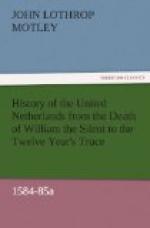The pretender of Portugal, Don Antonio, prior of Crato, was also in Paris; and it was the policy of both the French and the English governments to protect his person, and to make use of him as a rod over the head of Philip. Having escaped, after the most severe sufferings, in the mountains of Spain, where he had been tracked like a wild beast, with a price of thirty thousand crowns placed upon his head, he was now most anxious to stir the governments of Europe into espousing his cause, and into attacking Spain through the recently acquired kingdom of Portugal. Meantime, he was very desirous of some active employment, to keep himself from starving, and conceived the notion, that it would be an excellent thing for the Netherlands and himself, were he to make good to them the loss of William the Silent.
“Don Antonio,” wrote Stafford, “made a motion to me yesterday, to move her Majesty, that now upon the Prince of Orange’s death, as it is a necessary thing for them to have a governor and head, and him to be at her Majesty’s devotion, if her Majesty would be at the means to work it for him, she should be assured nobody should be more faithfully tied in devotion to her than he. Truly you would pity the poor man’s case, who is almost next door to starving in effect.”
A starving condition being, however, not the only requisite in a governor and head to replace the Prince of Orange, nothing came of this motion. Don Antonio remained in Paris, in a pitiable plight, and very much environed by dangers; for the Duke of Guise and his brother had undertaken to deliver him into the hands of Philip the Second, or those of his ministers, before the feast of St. John of the coming year. Fifty thousand dollars were to be the reward of this piece of work, combined with other services; “and the sooner they set about it the better,” said Philip, writing a few months later, “for the longer they delay it, the less easy will they find it."’
The money was never earned, however, and meantime Don Antonio made himself as useful as he could, in picking up information for Sir Edward Stafford and the other opponents of Spanish policy in Paris.
The English envoy was much embarrassed by the position of affairs. He felt sure that the French monarch would never dare to enter the lists against the king of Spain, yet he was accurately informed of the secret negotiations with the Netherlands, while in the dark as to the ultimate intentions of his own government.
“I was never set to school so much,” he wrote to Walsingham (27th July, 1584), “as I have been to decipher the cause of the deputies of the Low Countries coming hither, the offers that they made the King here, and the King’s manner of dealing with them!”
He expressed great jealousy at the mystery which enveloped the whole transaction; and much annoyance with Noel de Caron, who “kept very secret, and was angry at the motion,” when he endeavoured to discover the business in which they were engaged. Yet he had the magnanimity to request Walsingham not to mention the fact to the Queen, lest she should be thereby prejudiced against the States.




